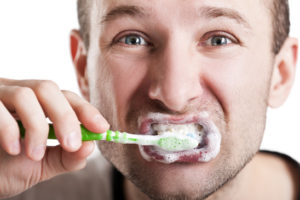 Preventive dentistry, including at-home care and your twice-yearly dental exam, is the best way to keep your teeth healthy. Diligent everyday oral hygiene helps prevent cavities and gum disease, and regular visits to the dentist help diagnose any problems in their earliest stages.
Preventive dentistry, including at-home care and your twice-yearly dental exam, is the best way to keep your teeth healthy. Diligent everyday oral hygiene helps prevent cavities and gum disease, and regular visits to the dentist help diagnose any problems in their earliest stages.
At-Home Oral Care
Everyday oral care includes daily brushing and flossing. Use a toothbrush that’s not too stiff to avoid damage to your enamel. You should also use fluoride toothpaste since fluoride helps your teeth remineralize. This process can reverse tooth decay in its earliest stages. If you have other issues regarding your teeth, you can use a whitening toothpaste, a toothpaste formulated to reduce plaque, or one made to help reduce bad breath. Proper technique is important, so if you have questions about the appropriate brushing technique, ask your dentist for a demonstration.
The technique is also important to effective flossing. Floss can be difficult to maneuver, particularly if you have any kind of mobility issues such as arthritis. If you find it difficult to floss correctly, or if you have a hard time exerting sufficient pressure with your toothbrush, ask your dentist about special tools. These can be helpful to older patients as well as small children who are just learning how to clean their teeth on their own.
Why It’s Important to Visit the Dentist
At-home treatment is vital, but problems can develop that you won’t be able to see right away. Issues like tooth decay and gum disease don’t exhibit obvious symptoms until they have progressed to a point where they need fairly extensive treatment. Your dentist, however, can diagnose these conditions while they’re still easy to remedy.
Your dentist helps you keep your oral care on track by providing:
- X-rays
- Visual exam
- Tests for gum health
- Oral cancer screening
- Fluoride treatments
- Sealants
By visiting your dentist twice a year as recommended, you can increase the odds that any problems that might be developing will be found in their early stages and treated before they become serious. Contact us at Westside Dental today to schedule your appointment!
